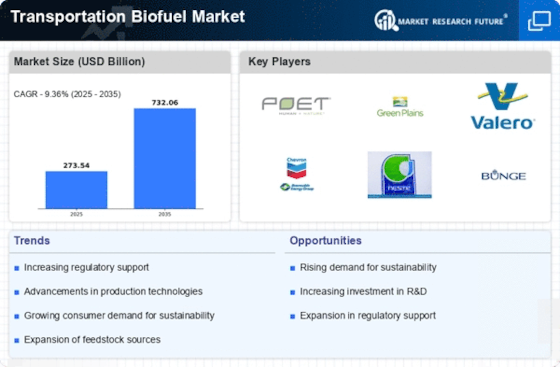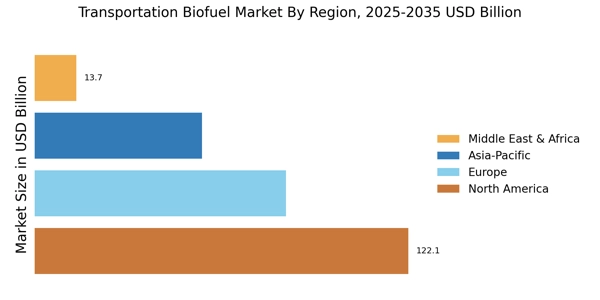Rising Environmental Concerns
The Transportation Biofuel Market is experiencing a surge in demand due to increasing environmental concerns. As awareness of climate change and air pollution grows, consumers and governments alike are seeking sustainable alternatives to fossil fuels. Biofuels, derived from organic materials, offer a cleaner combustion process, which significantly reduces greenhouse gas emissions. In fact, studies indicate that biofuels can reduce lifecycle greenhouse gas emissions by up to 80% compared to conventional fuels. This shift towards eco-friendly transportation solutions is likely to drive investments in biofuel production technologies and infrastructure, thereby enhancing the overall market landscape. Furthermore, the Transportation Biofuel Market is poised to benefit from policies aimed at promoting renewable energy sources, which could further accelerate the transition to biofuels.
Government Incentives and Policies
The Transportation Biofuel Market is significantly influenced by government incentives and policies aimed at promoting renewable energy. Various countries have implemented tax credits, subsidies, and mandates to encourage the adoption of biofuels. For instance, the Renewable Fuel Standard in the United States mandates a certain volume of renewable fuel to be blended into transportation fuel. Such policies not only stimulate demand but also create a favorable investment climate for biofuel producers. According to recent data, countries with robust biofuel policies have seen a marked increase in biofuel production, with some regions reporting growth rates exceeding 10% annually. This regulatory support is likely to continue shaping the Transportation Biofuel Market, as governments strive to meet climate goals and reduce dependency on fossil fuels.
Diversification of Feedstock Sources
The Transportation Biofuel Market is benefiting from the diversification of feedstock sources, which enhances sustainability and reduces competition with food supplies. Traditional biofuels have primarily relied on food crops, but there is a noticeable shift towards using non-food feedstocks such as algae, agricultural residues, and waste oils. This diversification not only mitigates food security concerns but also opens new avenues for biofuel production. Recent studies suggest that utilizing waste materials could potentially increase biofuel production capacity by up to 50% without additional land use. As a result, the Transportation Biofuel Market is likely to experience growth driven by these innovative feedstock solutions, which align with global sustainability goals.
Increasing Demand for Renewable Energy Sources
The Transportation Biofuel Market is witnessing a robust increase in demand for renewable energy sources. As nations strive to transition away from fossil fuels, biofuels are emerging as a viable alternative for transportation. The International Energy Agency has reported that biofuels accounted for approximately 3% of total transport fuel consumption in recent years, with projections indicating a potential increase to 10% by 2030. This growing demand is driven by both consumer preferences for sustainable options and corporate commitments to reduce carbon footprints. Consequently, the Transportation Biofuel Market is likely to see heightened investment and innovation as stakeholders seek to capitalize on this trend, further solidifying biofuels' role in the energy landscape.
Technological Advancements in Biofuel Production
Technological advancements are playing a pivotal role in shaping the Transportation Biofuel Market. Innovations in production processes, such as advanced fermentation techniques and enzyme technologies, are enhancing the efficiency and yield of biofuel production. For example, second-generation biofuels, which utilize non-food feedstocks like agricultural waste, are gaining traction due to their lower environmental impact. The market for these advanced biofuels is projected to grow significantly, with estimates suggesting a compound annual growth rate of over 15% in the coming years. These technological improvements not only lower production costs but also expand the range of feedstocks that can be utilized, thereby diversifying the Transportation Biofuel Market and making it more resilient to supply chain disruptions.

















